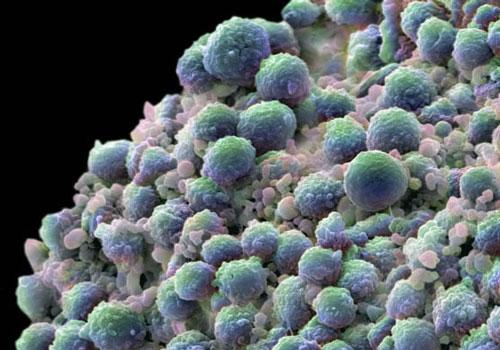摘要:编码转录因子的E26 transformation-specific (ETS)家族成员在前列腺癌中广泛存在转位突变。Dixit及其同事发现,“泛素连接酶”COP1在正常情况下使某些ETS因子“泛素化”,导致它们降解。然而,突变的ETS成员编码没有COP1识别信号的转录因子,因而能躲过降解。COP1是一个肿瘤抑制因子,其监视功能丧失常常引起ETS转录因子水平上升和小鼠前列腺癌的发生。研究人员还发现,同ETS转位突变的效果一致,COP1的去除也会引起ETS转录因子水平上升和前列腺癌的发生。

前列腺肿瘤细胞
生物探索推荐英文摘要
Nature doi:10.1038/nature10005
COP1 is a tumour suppressor that causes degradation of ETS transcription factors
Abstract: The proto-oncogenes ETV1, ETV4 and ETV5 encode transcription factors in the E26 transformation-specific (ETS) family, which includes the most frequently rearranged and overexpressed genes in prostate cancer1, 2, 3, 4. Despite being critical regulators of development, little is known about their post-translational regulation. Here we identify the ubiquitin ligase COP1 (also known as RFWD2) as a tumour suppressor that negatively regulates ETV1, ETV4 and ETV5. ETV1, which is mutated in prostate cancer more often, was degraded after being ubiquitinated by COP1. Truncated ETV1 encoded by prostate cancer translocation TMPRSS2:ETV1 lacks the critical COP1 binding motifs and was 50-fold more stable than wild-type ETV1. Almost all patient translocations render ETV1 insensitive to COP1, implying that this confers a selective advantage to prostate epithelial cells. Indeed, COP1 deficiency in mouse prostate elevated ETV1 and produced increased cell proliferation, hyperplasia, and early prostate intraepithelial neoplasia. Combined loss of COP1 and PTEN enhanced the invasiveness of mouse prostate adenocarcinomas. Finally, rare human prostate cancer samples showed hemizygous loss of the COP1 gene, loss of COP1 protein, and elevated ETV1 protein while lacking a translocation event. These findings identify COP1 as a tumour suppressor whose downregulation promotes prostatic epithelial cell proliferation and tumorigenesis.







